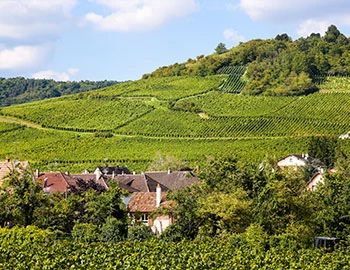
Calice de Saint Pierre blanc 2023
AC Châteauneuf-du-Pape, Domaine Pères de l'Eglise, 750 ml

| Grape variety: | Grenache Blanc, Clairette blanche, Bourboulenc |
| Producer: | Domaine des Pères de l'Eglise |
| Origin: | France / Rhône / Châteauneuf-du-Pape |
| Other vintages: |
Description
Merely reading the label transports you in spirit to this region with its Mediterranean clime, evoking longing memories of your last summer in Occitania. This white Châteauneuf-du-Pape smells of white flowers, refreshing grapefruit, spicy rosemary and slightly tart green tea. It opulently envelops the palate and is elegant, lively and juicy with a fine grip. Herbs of Provence, nougat and walnut aromas, wet stones, vanilla and Granny Smith combine to pleasant effect.
Attributes
| Origin: | France / Rhône / Châteauneuf-du-Pape |
| Grape variety: | Grenache Blanc, Clairette blanche, Bourboulenc |
| Ripening potential: | 1 to 5 years |
| Drinking temperature: | 10 to 12 °C |
| Food Pairing: | Vegetable flan, quiche, Whitefish fillets à la meunière, Bouillabaisse, Calf's kidneys with mustard sauce, Coquilles Saint Jacques on lentils |
| Vinification: | fully destemmed, short must fermentation |
| Harvest: | hand-picking, selecting the grapes (by hand) |
| Maturation: | partly in wooden barrel/foudre, partly in steel tank, on the yeast, bâtonnage |
| Maturation duration: | 6 months |
| Volume: | 13.5 % |
| Note: | Contains sulphites |
Domaine des Pères de l'Eglise
In 1933, the winegrowers and wine merchants of Châteauneuf-du-Pape were the first to impose quality rules relating to the cultivation and production of wines that would bear the name Châteauneuf-du-Pape. The geographic definition of the cultivation area, along with the other regulations, is still in force today, in order to guarantee the wine quality for connoisseurs. The Gradassi family of the Domaine des Pères de l’Église is following the tradition, but with the fresh impetus provided by the young fourth generation.
The fourth generation is represented by Laetitia, who after completing a course in business studies spent two years in Australia and New Zealand, in order to gather experience in wineries there. In 2014, she joined her father and uncle in the family wine estate. However, following her father’s unexpected death, she soon had to assume responsibility for the cellar. Her uncle, Serge Gradassi, predominantly takes care of work in the vineyard.
Since 2001, the best wines have been bottled under their own domaine name. Before then, the wine was sold directly to the trade. The family owns 19 hectares, of which approximately 15 are split into numerous plots spread across the entire Châteauneuf-du-Pape region. Unbelievably, the average age of the vines is 80 years. The family even owns a vineyard which, in 1885, was planted by the great-grandfather as a mixed culture comprising all 13 grape varieties permitted under the appellation.
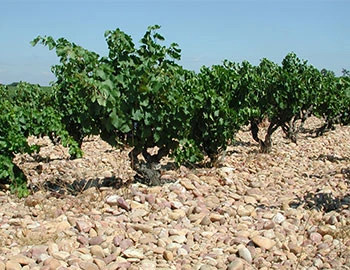
Clairette blanche
A hint of smoke
Lively citrus aromas and a touch of smoke are the hallmarks of the southern French Bourboulenc. It is also known as Clairette blanche or Malvoisie. This white wine grape is almost never produced solo. Instead, it lends its freshness to the white Châteauneuf-du-Pape and many other assemblages in southern France. Its origins lie in the Vaucluse Plateau in Provence. It turns out particularly delightfully in the massif of La Clapa in Languedoc, directly on the Mediterranean. There, the wines from Malvoisie acquire a salty-iodine note.
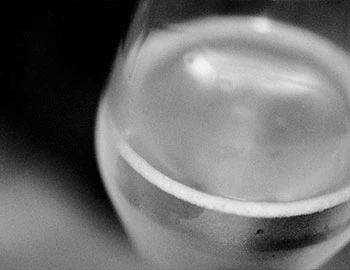
Bourboulenc
A hint of smoke
Lively citrus aromas and a touch of smoke are the hallmarks of the southern French Bourboulenc. It is also known as Clairette blanche or Malvoisie. This white wine grape is almost never produced solo. Instead, it lends its freshness to the white Châteauneuf-du-Pape and many other assemblages in southern France. Its origins lie in the Vaucluse Plateau in Provence. It turns out particularly delightfully in the massif of La Clapa in Languedoc, directly on the Mediterranean. There, the wines from Malvoisie acquire a salty-iodine note.
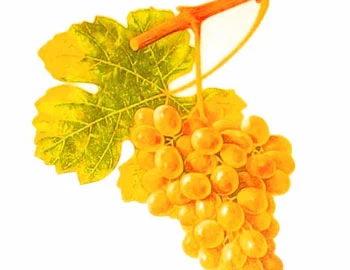
Grenache Blanc
Strength for the white Châteauneuf
Grenache blanc is the white variant of the popular Mediterranean Grenache grape. It is grown primarily in the south of France. But it rarely appears by itself on the label. Its wines charm with their creamy texture, rich fruit and fine floral aromas, along with a distinctive anise note. But they develop quite a lot of alcohol. For this reason, it is often blended with more sparkling varieties. Vintners appreciate the Grenache blanc as an ingredient in the white Châteauneuf-du-Pape. It also flows into the light versions of Banyuls and Maury. Similar to port wines, these are dessert wines from French Catalonia, which are traditionally produced in carboys.
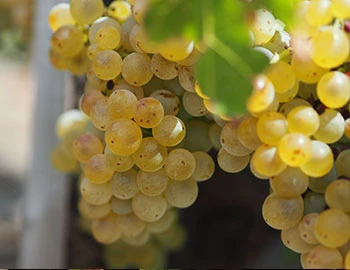
Rhône
Rhône: northern power, southern charm
The Rhône’s source is in Valais, and it flows into the Mediterranean 800 kilometres to the south. In the last 200 kilometres of its course, it is lined with vines which yield a range of red crus that are among the most prestigious wines in the world – for example, on the spectacular cliffs of the Hermitage Mountains, or in the gravelly terraces of Châteauneuf-du-Pape. The river valley, however, is also a rich source of characterful white wines and affordable, high-quality, everyday red wines.
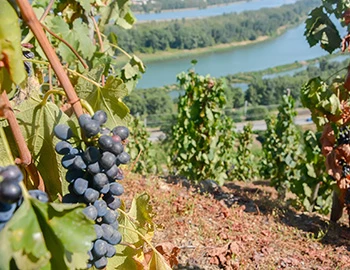
France
France – Philosophy in a bottle
According to French philosophy, wine should be an expression of the soil and climate. They use the word “terroir” to describe this. Terroir makes every wine different, and many especially good. French wine is regarded worldwide as an expression of cultural perfection. The French believe that humans are responsible for the quality of the berries, the vine variety for their character, and nature for the quantity. This philosophy can be expressed succinctly as: “the truth is the vineyard, not the man.”
